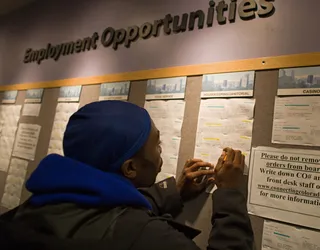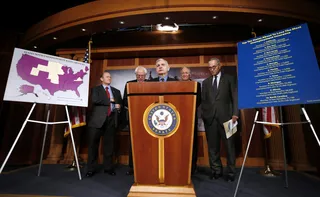Fear of Falling: What Will Going Over the Fiscal Cliff Mean to You?
The fiscal cliff's impact on individuals and the economy.

1 / 10
What's at Stake? - House Speaker John Boehner's Plan B proposal to increase taxes on incomes of $1 million and above was a major setback for the fiscal cliff negotiation process. But as President Obama and congressional lawmakers continue their struggle to reach a deal, millions of Americans may need to craft their own Plan B. Here's the 411 on what could happen if the nation falls over the cliff. – Joyce Jones (Photos: Alex Wong/Getty Images)

2 / 10
Unemployment - The nonpartisan Congressional Budget Office reports that the automatic spending cuts and tax hikes that would result from going over the cliff would send the U.S. economy into a new recession. Unemployment would also rise to 9.1 percent by the end of 2013. (Photo: Matthew Staver /Landov)
Photo By Photo: Matthew Staver /Landov

3 / 10
Unemployment Insurance - Approximately 2 million Americans may lose federal unemployment insurance benefits that aid the long-term unemployed. (Photo: REUTERS/Jason Reed)
Photo By Photo: REUTERS/Jason Reed

4 / 10
Government Jobs - According to a report by George Mason University's Center for Regional Analysis, approximately 277,000 public sector workers will lose their jobs as a result of spending cuts. And, in the next 10 years, the government workforce would be reduced by about 14 percent. (Photo: Getty Images/STOCK)

5 / 10
Payroll Tax Holiday - Deal or no deal, lawmakers are likely to allow the temporary Social Security payroll tax holiday to expire and the rate will increase by 2 percent. That means an average $40 less per paycheck. (Photo: Mark Wilson/Getty Images)
ADVERTISEMENT

6 / 10
Social Security - Obama and Republican leaders have tentatively agreed to a lower cost-of-living adjustment to social security benefits for retirees, which many Democrats oppose. The plan also could affect veterans' benefits and government pensions. (Photo: Jim McGuire/Getty Images/STOCK)

7 / 10
Higher Taxes for More - According to a Tax Policy Center report, 88 percent of taxpayers would see their taxes rise by an average of $3,500 per year. Households with incomes of $50,000 to $75,000 would see an increase of $2,400 per year. (Photo: Comstock/STOCK)

8 / 10
Ripple Effect - Paying more in taxes means consumers will have less money to spend, which will impact businesses and slow their rate of hiring. (Photo: Justin Sullivan/Getty Images)

9 / 10
Got Milk? - Distracted by their fiscal cliff negotiations, lawmakers may not get to extend expiring federal agriculture supplements in the Farm Bill, which would cause the price of milk to soar. Consumers could find themselves paying between $6 and $8 per gallon, which low-income and many middle-class families cannot afford. (Photo: Chip Somodevilla/Getty Images)
